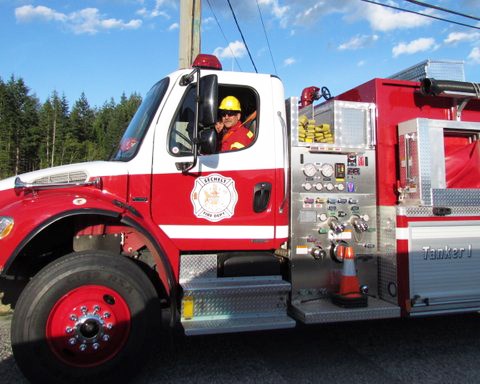Sunshine Coast Regional District (SCRD) emergency program coordinator Bill Elsner has been in the Interior since Sunday, helping efforts to combat wildfires that have around 16,000 people under evacuation orders or alerts. Several homes have also been destroyed by the fires raging near communities that include 100 Mile House, Williams Lake, Ashcroft and Princeton.
Firefighters and equipment from Sunshine Coast fire departments have also been requested for the first time since the 2003 Kelowna fires.
As of Wednesday morning, Halfmoon Bay was asked to send a tender and two firefighters, and Sechelt is sending a tanker truck capable of delivering 9,000 litres of water and a team of two firefighters on rotating six-day shifts. Other departments are ready if needed.
The call for help from the Sunshine Coast, as well as other B.C. communities, other provinces, and the federal government, followed the declaration of a province-wide state of emergency last week.
SCRD chief administrative officer Janette Loveys said that prior to fire season every year, the departments tell the province what resources they could offer if needed. Sunshine Coast fire departments are volunteer-based, and firefighters’ participation in the emergency response is also voluntary.
“We’re thankful that our fire crews are willing to step up and want to be able to help out when [an emergency] like this is happening,” Loveys said.
She also said all the fire departments, including Pender Harbour and Sechelt, which are independent from the SCRD, are working together to ensure there is proper coverage and support should an emergency arise here.
There’s a similar message from the Wildfire Service, which said in a release July 11 that although some Coastal Fire Centre resources are being sent to the Interior, “sufficient firefighters and equipment will remain in the region to maintain a first response capability locally. At this time, every fire zone within the Coastal Fire Centre has its initial attack crews on maximum standby readiness.”
Fire danger ratings have now jumped to high for the entire Sunshine Coast, and a campfire and open burning ban has been in effect since July 6.
Sechelt Fire Chief Trevor Pike said their message to the public is to urge them to abide by the bans and follow common sense precautions like disposing of cigarette butts properly. “We can’t afford to have a [fire] start down here with so many resources committed in other parts of the province. It’s important that the whole community helps out.”
Local governments are also reminding residents to take some time to review the advice in the Wildfire Service’s “FireSmart Home-owner’s Manual,” which is available at www.bcwildfire.ca/prevention/docs/homeowner-firesmart.pdf
Loveys also confirmed the SCRD is hoping to start work on a Community Wildfire Protection Plan in 2017-18. Having those plans in place for areas where interface fires are a risk is one of the goals of the province’s Strategic Wildfire Prevention Initiative that came out of the Filmon report on the 2003 Kelowna fire.
Part of the cost to create and act on the plans can be covered through provincial and Union of BC Municipalities grants.
There are several easy ways for Sunshine Coast residents to help the evacuees.
The Red Cross is accepting donations online at www.redcross.ca/how-we-help/current-emergency-responses/british-columbia-fires
The money will be used for “cots, blankets, family reunification as well as financial assistance so individuals and families can get the food, clothing, shelter and anything else that can help them recover from this tragedy.”
You can also contribute $10 instantly to the Red Cross BC Fires Appeal by texting FIRES to 45678, and BC Liquor Stores are accepting donations of $2, $5 (or in multiples of $2 and $5) from customers directly at the till.
London Drugs has been donating supplies to evacuation centres in Kamloops and Prince George and to the Ashcroft First Nation. All the stores in the chain are also accepting donations for the Red Cross at the checkout.



